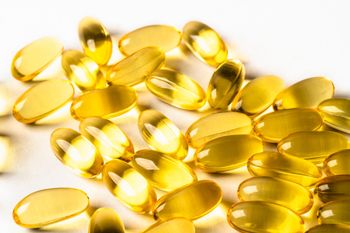
- Nutritional Outlook Vol. 18 No. 7
- Volume 18
- Issue 7
Fish Oil Omega-3s May Increase Muscle Mass in Healthy Older Adults
A new study suggests fish oil-derived omega-3 supplements may help fight the effects of sarcopenia.
Fish oil-derived omega-3 dietary supplements may increase muscle function and mass in healthy older adults when taken daily, according to a new study by the Center for Human Nutrition, Washington University School of Medicine (St. Louis, MO).
Writing in The American Journal of Clinical Nutrition, researchers reported that healthy adults aged 60-85 who received 3.36 g of EPA/DHA omega-3 per day experienced an increase in thigh muscle volume, handgrip strength, one repetition muscle strength, and tended to increase average isokinetic leg muscle power when compared with a placebo group.
The omega-3 polyunsaturated fatty acids (PUFA) were derived from fish oil and administered at a daily amount equivalent to 200-400g of freshwater fatty fish.
“The study indicates that dietary supplementation with marine n-3 PUFAs has significant anabolic and, even more importantly, function-enhancing effects on muscle in older adults,” says Bettina Mittendorfer, PhD, one author of the study.
Study Design
The double-blind, randomized controlled trial involved sixty men and women aged 60-85 years old who were given either 3.6 g EPA/DHA omega-3 derived fish oil or a corn oil placebo to take daily for six months. Both the experimental and placebo treatment came in the form of four identical looking 1 g pills.
At the beginning and end of the treatment period, researchers evaluated the muscle volume, handgrip strength, one-repetition maximum lower- and upper-body strength, and average power during isokinetic leg exercises.
Body weight, total body fat mass, and inter-muscular fat content were not significantly affected by the omega-3 PUFA therapy, but there was a significant increase in thigh muscle volume, handgrip strength, and one-repetition muscle strength (a composite score for leg press, chest press, knee extension, and knee flexion). Average isokinetic leg muscle power also tended to increase, according to researchers.
Based on the study results, the researchers concluded that fish oil-derived omega-3 PUFA therapy “should be considered a therapeutic approach for preventing sarcopenia and maintaining physical independence in older adults.”
“This is an important development and has direct clinical relevance, as currently, besides vitamin D, there are no treatments good enough for the prevention and treatment of sarcopenia aside from regular exercise, which is difficult to adhere to especially in older peoples,” says Mittendorfer. “In addition, our findings open avenues for the discovery of potential new cellular mechanism that are critical for the regulation of muscle mass and function, which we plan to pursue in the near future.”
DSM Nutritional Products (Parsippany, NJ), a supplier of both marine and vegetarian based omega-3 ingredients, shared the findings of the study in a press release.
“Omega-3 is a safe and effective therapy to prevent aging-associated decline in muscle mass and function,” says Manfred Eggersdorfer, PhD, senior vice president of nutrition, science, and advocacy at DSM.
Read more:
Michael Crane
Associate Editor
Nutritional Outlook Magazine
References:
Smith GI et al., “Fish oil-derived n-3 PUFA therapy increases muscle mass and function in healthy older adults.” The American Journal of Clinical Nutrition, vol. 102, no. 1 (July 2015): 115-122
Articles in this issue
about 10 years ago
What Makes Palm Oil a Top Replacer for Partially Hydrogenated Oils?about 10 years ago
Infant Formula Market Opportunitiesabout 10 years ago
Bone-Health Cofactors: New Science on Vitamin D, K2, Magnesium, and Zincabout 10 years ago
Weight Management and Nutrition Strategies for Childrenabout 10 years ago
Topical and Ingestible Cosmetics Get Togetherabout 10 years ago
Energy Drinks Are Still Going Strongabout 10 years ago
New Breakthroughs in Omega-3 Researchover 10 years ago
What Does Non-GMO Certification Cost? 5 Things to Knowover 10 years ago
Preparing for FDA's Review of Animal Food Ingredientsover 10 years ago
Non-GMO Riding on Organic’s Coattails?Newsletter
From ingredient science to consumer trends, get the intel you need to stay competitive in the nutrition space—subscribe now to Nutritional Outlook.





